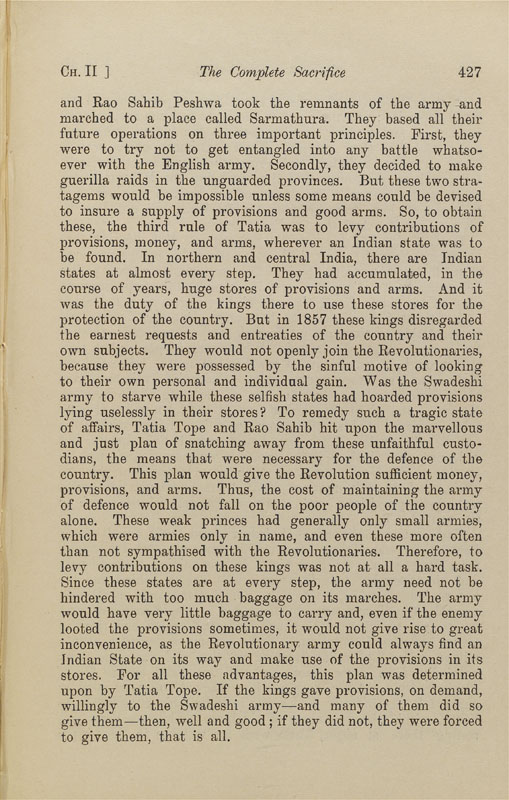Ch. II J The Complete Sacrifice 427
and Rao Sahib Peshwa took the remnants of the army and
marched to a place called Sarmathura. They based all their
future operations on three important principles. First, they
were to try not to get entangled into any battle whatso¬
ever with the English army. Secondly, they decided to make
guerilla raids in the unguarded provinces. But these two stra¬
tagems would be impossible unless some means could be devised
to insure a supply of provisions and good arms. So, to obtain
these, the third rule of Tatia was to levy contributions of
provisions, money, and arms, wherever an Indian state was to
be found. In northern and central India, there are Indian
states at almost every step. They had accumulated, in the
course of years, huge stores of provisions and arms. And it
was the duty of the kings there to use these stores for the
protection of the country. But in 1857 these kings disregarded
the earnest requests and entreaties of the country and their
own subjects. They would not openly join the Revolutionaries,
because they were possessed by the sinful motive of looking
to their own personal and individual gain. Was the Swadeshi
army to starve while these selfish states had hoarded provisions
lying uselessly in their stores ? To remedy such a tragic state
of affairs, Tatia Tope and Rao Sahib hit upon the marvellous
and just plan of snatching away from these unfaithful custo¬
dians, the means that were necessary for the defence of the
country. This plan would give the Revolution sufficient money,
provisions, and arms. Thus, the cost of maintaining the army
of defence would not fall on the poor people of the country
alone. These weak princes had generally only small armies,
which were armies only in name, and even these more often
than not sympathised with the Revolutionaries. Therefore, to
levy contributions on these kings was not at all a hard task.
Since these states are at every step, the army need not be
hindered with too much baggage on its marches. The army
would have very little baggage to carry and, even if the enemy
looted the provisions sometimes, it would not give rise to great
inconvenience, as the Revolutionary army could always find an
Indian State on its way and make use of the provisions in its
stores. For all these advantages, this plan was determined
upon by Tatia Tope. If the kings gave provisions, on demand,
willingly to the Swadeshi army—and many of them did so
give them—then, well and good ; if they did not, they were forced
to give them, that is all.
|








